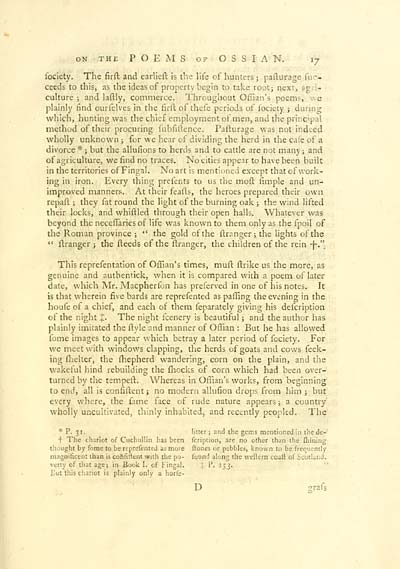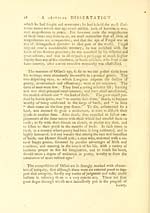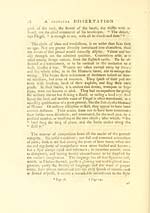Download files
Complete book:
Individual page:
Thumbnail gallery: Grid view | List view

ON THE POEMS OF O S S I A N. 17
Ibciety. The firft and earlieft is the life of hunters ; pafturage fuc-
ceeds to this, as the ideas of property begin to take rootj next, sgri-
culture ; and laftly, commerce. Throughout Ofilan's poems, v.e
plainly find ourfelves in the tirll of thefe periods of (ociety ; during
which, hunting was the chief employment of men, and the principal
method of their procuring fubfiftence. Pafturage was not indeed
wholly unknown ; for we hear of dividing the herd in the cafe of a
divorce*; but the allufions to herds and to cattle are not many; and
of agriculture, we find no traces. No cities appear to have been built
in the territories of Fingal. No art is mentioned except that of work-
ing in iron. Every thing prefents to us the moft fimple and un-
improved manners. At their feafts, the heroes prepared their own
repaft ; they fat round the light of the burning oak ; the wind lifted
their locks, and whiftled through their open halls. Whatever was
beyond the neceflaries of life was known to them only as the fpoil of
the Roman province; " the gold of the ftrr,nger;the lights of the
" ftranger j the fteeds of the ftranger, the children of the rein -f-.''
This reprefentation of Ofllan's times, muft ftrike us the more, as
genuine and authentick, when it is compared with a poem of later
date, which Mr. Macpherfon has preferved in one of his notes. It
is that wherein five bards are reprefented as pafling the evening in the
houfe of a chief, and each of them feparately giving his defcription
of the night +. The night fcenery is beautiful ; and the author has
plainly imitated the ftyle and manner of Offian : But he has allowed
fome images to appear which betray a later period of fociety. For
we meet with windows clapping, the herds of goats and cows feek-
ing flielter, the fhepherd wandering, corn on the plain, and the
wakeful Innd rebuilding the fliocks of corn which had been over-
turned by the tempeft. Whereas in Oflian's works, from beginning
to end, all is confident ; no modern allufion drops from him ; but
every where, the fame face of rude nature appears ; a country
wholly uncultivated, thinly inhabited, and recently peopled. The
* P. 31. litter; and the gems mentioned in the de-
t The chariot of Cuchullin has been fcription, are no other than the Ihiiiing
thought by fome to be reprefented as more ftones or pebbles, known to bs frequently
magnificent than is cohfittent with the po- found along the weflern coall of Scotliind.
verty of that age; in Book I. of Fingal. 1 P. 253.
Eut this cliariot is plainly only a horfe-
D srafs
Ibciety. The firft and earlieft is the life of hunters ; pafturage fuc-
ceeds to this, as the ideas of property begin to take rootj next, sgri-
culture ; and laftly, commerce. Throughout Ofilan's poems, v.e
plainly find ourfelves in the tirll of thefe periods of (ociety ; during
which, hunting was the chief employment of men, and the principal
method of their procuring fubfiftence. Pafturage was not indeed
wholly unknown ; for we hear of dividing the herd in the cafe of a
divorce*; but the allufions to herds and to cattle are not many; and
of agriculture, we find no traces. No cities appear to have been built
in the territories of Fingal. No art is mentioned except that of work-
ing in iron. Every thing prefents to us the moft fimple and un-
improved manners. At their feafts, the heroes prepared their own
repaft ; they fat round the light of the burning oak ; the wind lifted
their locks, and whiftled through their open halls. Whatever was
beyond the neceflaries of life was known to them only as the fpoil of
the Roman province; " the gold of the ftrr,nger;the lights of the
" ftranger j the fteeds of the ftranger, the children of the rein -f-.''
This reprefentation of Ofllan's times, muft ftrike us the more, as
genuine and authentick, when it is compared with a poem of later
date, which Mr. Macpherfon has preferved in one of his notes. It
is that wherein five bards are reprefented as pafling the evening in the
houfe of a chief, and each of them feparately giving his defcription
of the night +. The night fcenery is beautiful ; and the author has
plainly imitated the ftyle and manner of Offian : But he has allowed
fome images to appear which betray a later period of fociety. For
we meet with windows clapping, the herds of goats and cows feek-
ing flielter, the fhepherd wandering, corn on the plain, and the
wakeful Innd rebuilding the fliocks of corn which had been over-
turned by the tempeft. Whereas in Oflian's works, from beginning
to end, all is confident ; no modern allufion drops from him ; but
every where, the fame face of rude nature appears ; a country
wholly uncultivated, thinly inhabited, and recently peopled. The
* P. 31. litter; and the gems mentioned in the de-
t The chariot of Cuchullin has been fcription, are no other than the Ihiiiing
thought by fome to be reprefented as more ftones or pebbles, known to bs frequently
magnificent than is cohfittent with the po- found along the weflern coall of Scotliind.
verty of that age; in Book I. of Fingal. 1 P. 253.
Eut this cliariot is plainly only a horfe-
D srafs
Set display mode to: Large image | Transcription
Images and transcriptions on this page, including medium image downloads, may be used under the Creative Commons Attribution 4.0 International Licence unless otherwise stated. ![]()
| Early Gaelic Book Collections > Ossian Collection > Critical dissertation on the poems of Ossian, the son of Fingal > (63) |
|---|
| Permanent URL | https://digital.nls.uk/77432286 |
|---|
| Description | Selected books from the Ossian Collection of 327 volumes, originally assembled by J. Norman Methven of Perth. Different editions and translations of James MacPherson's epic poem 'Ossian', some with a map of the 'Kingdom of Connor'. Also secondary material relating to Ossianic poetry and the Ossian controversy. |
|---|
| Description | Selected items from five 'Special and Named Printed Collections'. Includes books in Gaelic and other Celtic languages, works about the Gaels, their languages, literature, culture and history. |
|---|

